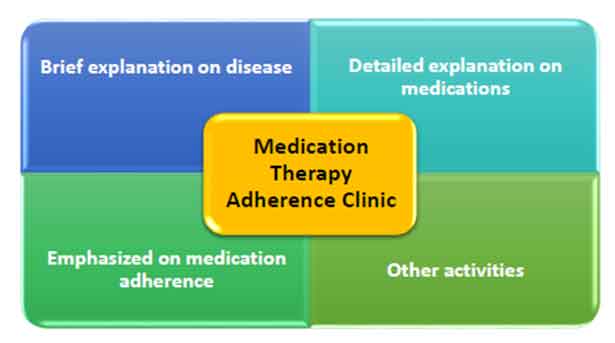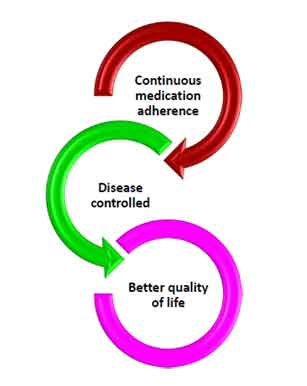Introduction
Medication Therapy Adherence Clinic or MTAC is an ambulatory care services provided by trained pharmacists to patients in hospitals or health clinics.
The main objective of these services is to:
- Improve patients’ understanding of medicines taken by the patient
- Improve patients’ adherence to medication
Types of MTAC Services
MTAC services being offered to patients who requires more detailed information and guidance related to medications to control the disease and achieve the individually set targets. For example, in general, HbA1c (glycated haemoglobin, provides a measure of the average glucose concentration over three months) target for people with diabetes is less than 7%.
As of July 2023, there are 15 types of MTAC recognized by the Pharmaceutical Services Division, Ministry of Health Malaysia. The 15 types of MTAC is diabetes mellitus, respiratory, aticoagulant, haemophilia, neurology, rheumatology, psoriasis, psychiatric, geriatric, retroviral disease, nephrology, cardiac rehabilitation, thalassemia, hepatitis and heart failure.
MTAC service comprises of few sessions of visits. Generally, patients will undergo at least 4 sessions of MTAC to ensure the effectiveness of these services.
MTAC services comprise of few sessions of visits. Generally, patients will undergo at least 4 sessions of MTAC to ensure the effectiveness of these services. Patients will be monitored and counselled on specific modules that have been set according to the type of MTAC and customized according to each patient’s needs.
For the first session:
- Pharmacists will interview patients about the disease and their treatment history.
- Patient will also be assessed on general knowledge about the disease and the patient’s medication. This will allow pharmacist to identify the problems faced by the patient and components that need to be addressed during the next MTAC session.

Picture 1: Medication Therapy Adherence Clinic Services
On the second session onwards:
- Pharmacist will explain on the disease, detail description of prescribed medications, the importance of adhere and understanding of medication the patients’ taking to control the disease.
- There will be discussions on lab test results and how the targets to can be achieved.
- Patients will also be assisted on the appropriate method to help them take the prescribed medications. This is also an important element in ensuring that medications are taken continuously.
- Medication related issues will also be identified; for example, the side effects of medication or medication incompatibilities. Once a problem is identified, the pharmacist will discuss with the doctor. This allows appropriate action to be taken (such as the dose modification, change of medication and so on) to avoid the problem persisted.
Once patients understand their disease and medications, adherence to medications will be easier.

Picture 2: Aim for MTAC services
How do I get this service?
For the record, these services are provided at no extra charge. Almost all health clinics and hospitals in the Ministry of Health offers Diabetes MTAC service. While for other MTAC, it will be offered based on the specialty of the facility. Usually, eligible patients will referred by their attending doctors or recruited by the MTAC in charged pharmacists for the services. However, patients may also enquire pharmacists at their respective facility to find out about the MTAC services offered.
Each MTAC has pre-determined patient selection criteria. For example, criteria for Diabetes MTAC patients are:
- Patients with HbA1c readings more than 8%
- Patients who have problems with adherence to medication
- Patients who have problems with medications
- Patients who suffer from complications of the disease
Therefore, doctor or other health personnel can refer patients to MTAC services based on the established criteria.
| Last Reviewed | : | February 2024 |
| Writer/Translator | : | Nik Nuradlina binti Nik Adnan |
| Reviewer | : | Syafi’ah binti Bakaruddin |







